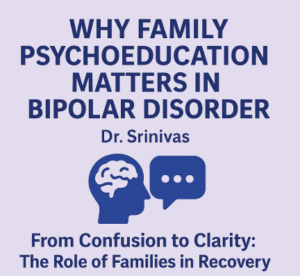Why Family Psychoeducation Matters in Bipolar Disorder
From Confusion to Clarity: The Role of Families in Recovery
🧠 “I don’t know how to help anymore…”
These are often the first words I hear from families. They’ve seen their loved one through sleepless highs and crushing lows. They’ve tried reasoning, pleading, scolding—even silence. And yet, the mood swings return.
Here’s what they rarely receive: proper education and guidance.
That’s where family psychoeducation comes in.
 💡 What is Family Psychoeducation?
💡 What is Family Psychoeducation?
It’s not just “information.” It’s a structured way of helping families:
-
Understand what bipolar disorder is (and isn’t)
-
Learn what helps and what doesn’t
-
Build empathy, boundaries, and a plan
It combines clinical knowledge with practical strategies tailored to the household setting.
👪 Why Families Are the Missing Link in Recovery
Bipolar disorder doesn’t just affect the person diagnosed—it impacts everyone around them.
When families are uninformed, even the best intentions can backfire.
Examples:
-
Criticizing behavior during a manic episode can worsen agitation.
-
Blaming the person for not trying hard enough can reinforce shame.
-
Ignoring warning signs of relapse can delay timely treatment.
Studies have shown that high levels of expressed emotion (EE)—criticism, hostility, over-involvement—are associated with higher relapse rates.
But here’s the hopeful part: EE is modifiable. Families can learn better ways to respond.
📈 What the Research Says
-
A landmark study by Dr. David Miklowitz (Family-Focused Therapy) showed that psychoeducated families saw significantly fewer relapses.
-
In India, studies at NIMHANS and other centers confirm that structured family involvement improves medication adherence and reduces hospitalization rates.
🧭 What You’ll Learn in This Series
Over the coming weeks, we’ll cover:
-
How to spot early signs of mania or depression
-
How to communicate during tough episodes
-
What to say (and not say) about medication
-
How to build structure without creating stress
-
When to seek help—and when to just listen
-
How to take care of yourself as a caregiver
💬 Takeaway
You don’t need to be a mental health professional to support someone with bipolar disorder.
But you do need:
-
The right knowledge
-
A shared language
-
And a little help to stop walking on eggshells
👨⚕️ About the Author
Dr. Srinivas Rajkumar T, MBBS, MD (Psychiatry)
Consultant Psychiatrist | Apollo Clinics Velachery & Tambaram
Specialist in Mood Disorders, Family-Based Interventions, and Psychoeducation
📞 Appointments: 85951 55808
🌐 Read more: www.srinivasaiims.com
📩 LinkedIn: Dr. Srinivas Rajkumar T